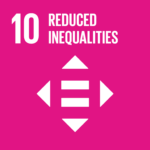The world’s 2 billion Muslims focus on the core values of the holy month Ramadhan : helping the poor and committing oneself to the service of others.
The Islamic month of fasting, Ramadan, is a month of consciousness and reflection. Therefore it offers us an ideal opportunity to think about our consumption pattern and behaviour towards our environment. This guide provides mosque and student communities with the basic guidelines for organising an Iftar event in a sustainable and environmentally friendly manner. At the same time this guide offers concrete tips and tricks regarding the Green Iftar Goals (GIGs), which we hope will stimulate a sustainable way of thinking and a sustainable behaviour in Ramadan.
RELEVANT SUSTAINABLE GOALS



Reduce Food Waste – Practice “Less Is More”
Food waste is a stark reality. During Ramadhan, we often prepare large quantities of food, resulting in unnecessary food waste. Let’s make a conscious effort to reduce food waste by planning our meals, using leftovers creatively, and sharing excess food with the less fortunate.
Go for locally produced food as much as possible. Long transportation routes reduce the vitality of the food, besides adding to the emissions footprint. Food that never gets eaten also represents a waste of resources, such as land, water, energy, soil, seeds and other inputs used in its production, thus increasing the emissions footprint. With a more conscious approach to food consumption, we can create more meaningful consumer beha- viour that is responsible, ecologi- cally, economically and spiritually.
Use Energy Efficiently
As Muslims, we believe that every good deed counts. Let’s make saving energy one of our good deeds this Ramadhan. Switch off lights when not in use, unplug electronic devices, and use energy-efficient appliances. Another way to save energy is by unplugging electronic devices when not in use. Electronics like televisions, computers, and chargers consume energy even when they are in standby mode. By unplugging them when not in use, you can save a significant amount of energy.
Conserve Water
Water is a precious resource, and we must conserve it. Let’s make a conscious effort to reduce water usage during Ramadhan by taking shorter showers, turning off the tap while brushing teeth, and using water-saving appliances.
One of the most effective ways to conserve water is by fixing leaks and drips. Even a small leak can waste a significant amount of water over time, so it’s important to fix them as soon as possible. Check for leaks in faucets, toilets, and pipes, and repair them promptly. Another way to save water is by using a bucket instead of a hose when washing your car or watering plants. This can save a significant amount of water, as hoses use much more water than buckets. You can also collect rainwater in a barrel and use it for watering your plants, which is a great way to conserve water.
Donate to Charities (including the extra food to those in need)
Even when the planning is perfect and no excess food has been orde- red or cooked, there is always a chance for things to go wrong. Just in case, have a food bank on stand- by and have them take the food that remains unused at the end. This way you can again consciously contribute to less food waste. In the planning phase itself, look for and sign up an organisation or a group that would take the unused food left at the end of the event – maybe a mosque in the vicinity which arranges pre-dawn Suhoor meals can take it!
Moreover, charity is an integral part of Ramadhan, and we should ensure that our donations also align with our sustainable values. Donate to charities that promote sustainable development, environmental conservation, and social justice.
Shop Ethically
Ramadhan is a time of giving, but we must also be mindful of where we source our gifts from. Let’s choose ethically sourced and produced products, support local businesses, and reduce our carbon footprint by shopping online.
Reduce Plastic Use
Plastic is one of the biggest threats to our planet, and we must take action to reduce our plastic usage. Bring your own reusable bags, bottles, and utensils, say no to single-use plastics, and encourage others to do the same.
The consumption of single use plastic has been a rapidly increasing trend for many years now. How does this happen? People get their food packed, and, in most cases, the food is eaten immediately afterwards, followed by single use plastic plates, cups, spoons, or boxes ending up in a garbage bin, or, in the worst case, in our environment. In order to reduce environmental pollution and energy-intensive waste disposal, we should ideally avoid single use, disposable tableware as far as possible.
It is almost impossible to imagine a life without plastic, given its ubiquity. Although a practical alternative on many occasions, plastic does not come without problems. Chemicals that are released from plastic materials and end up in the human body as micropla- stics are a health risk. The risks of improper use and disposal of plastic for the environment and human life are devastating. This needs to be kept in mind when dealing with plastics. In case of plastic that is unavoidable, make it a point to use and reuse it many times before it goes to trash, keeping the health risks of reusing it in mind.
Celebrate Nature
Let’s take a moment to appreciate the beauty of nature during Ramadan. Spend time outdoors, connect with nature, and reflect on the blessings of Allah’s creation.
Restore Nature and Plant Trees
Trees, mangroves and corals are the lungs of our planet, and we must plant more of them. This Ramadhan, consider planting a tree in your community or joining a local Nature-based initiative.
Spread The Word and Motivate Others To Take Up The Idea
The story of your commitment to environmental protection and sustain- ability through your word and deed can spread awareness and inspire many others in the community. Some like-minded people might have been looking for a torch bearer in this regard – a spark to kindle a whole movement! Your Iftar might be just that!
Let’s take this wisdom and apply it to sustainable practices. Educate others about the importance of sustainability and inspire them to take action.
Committing oneself to the service of others includes future generations. Taking care of our planet to make sure it remains habitable and can support life on earth as we know it for those who come after us is one of our key responsibilities. May the values embodied by Ramadhan—peace, compassion and generosity—prevail during this holy month, and throughout the year, and the years, decades and centuries to come.
You may also be interested in :
Asia EV Technology Summit 2023 : Exploring The Exciting Of EV Ecosystem In Indonesia




